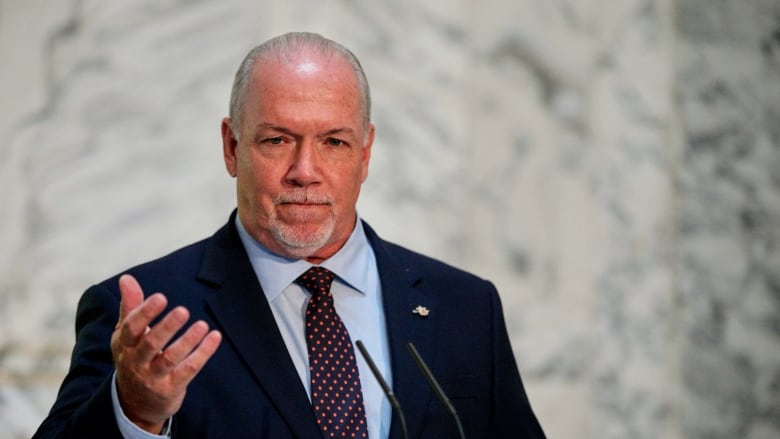B.C. reveals 89-point action plan to advance the rights of Indigenous Peoples
Government and Indigenous leaders herald 5-year plan as historic step toward reconciliation

The province has unveiled a five-year,89-point action plan to advance the United Nations Declaration on the Rights of Indigenous Peoples (UNDRIP), which became legislation in B.C. over two years ago.
Hailed as historicby government and Indigenous leaders speaking at its unveiling, the plan outlinesa list of "significant actions" the province is promising to undertake in consultation and cooperation with Indigenous Peoples.
Chief Jerry Jack of the B.C. Assembly of First Nationssaid the document charts a path to a renewed relationship with governmentand reconciliation.
"I commend this significant effort," said Jack."What [Indigenous Peoples] have been going through is multi-generational. I went with my dad to blockades in the 1970s, fighting for our rights. I don't want my grandchildren to still have to fight for our rights, our land back."
The 89 actions address a wide range of issues, including governance, land and water stewardship, salmon, education, anti-indigenous racism, child welfare, policing and justice, data collection, health care, sport and recreation, Indigenous languages, climate change, B.C.place names, cannabis policy and high-speed internetaccess.
Each of the 89 actions notes which provincial ministry is responsible for its implementation.
Premier John Horgan called the plan a roadmap to do "what has never been done on planet Earth before."
"This ... is a first for any government in the world. It will drive transformative change in the relationship with Indigenous Peoples and help us build a brighter future for everyone," saidHorgan.
B.C.became the first jurisdiction inNorth America to adopt UNDRIP when the Declaration on the Rights of Indigenous Peoples Act was passedunanimously by the legislative assemblyin 2019.
Rosalie Yazzie of theB.C.First Nations Justice Council urged quick action on the justice front to address the inherent racism and over-representation of Indigenous people in the justice system.
"We cannot ask people who are suffering the way so many Indigenous Peoples are to keep waiting. We either make changes that address this issue in real ways, or we are failing," she said.
"Reconciliation is a process that takes us all out of our comfort zoneand if you don't feel uncomfortable you're not doing it right."
Murray Rankin, minister of Indigenous relations and reconciliation, defended the plan as more than aspirational, sayingthe 89 actions are"tangible, measurable and achievable" in the five-year period.
"We will be held accountable every year in a real way," said Rankin. "[The plan]will not gather dust, it cannot, it's not allowed to."
B.C. Green MLA Adam Olsen, a member of the Tsartlip First Nation, criticized the action plan as "lay[ing] the groundwork for excuse making."
"The metric for success is not what we hear but what we see. Twenty-eight months after the Declaration Act was unanimously passed in the legislature, this government is only just moving forward," he said. "This plan outlines goals for reconciliation, but not the metrics for achieving them."












_(720p).jpg)


 OFFICIAL HD MUSIC VIDEO.jpg)
.jpg)



























































































